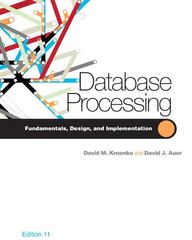Question
I am writing this program in C++. Here is part of the description of the assignment. I have to use a Linked List to implement
I am writing this program in C++. Here is part of the description of the assignment. I have to use a Linked List to implement this line of customers in an office. I have successfully implemented my link list. But I cannot figure out the logic of dealing with customers. See the image below. I only need help with the "main" function. The program is supposed to do this as well: Print a running log with a line detailing every time a client comes in the door or makes a phone call or has finally gotten her question answered. Each line should indicate the time the event happened, to whom it happened (number each client from 1 to however high they reach), and how long the line in the office is after the event. (The client currently being served counts as a member of the line, as do waiting phone callers.)
Any help or hints would be helpful.

Step by Step Solution
There are 3 Steps involved in it
Step: 1

Get Instant Access to Expert-Tailored Solutions
See step-by-step solutions with expert insights and AI powered tools for academic success
Step: 2

Step: 3

Ace Your Homework with AI
Get the answers you need in no time with our AI-driven, step-by-step assistance
Get Started


